april 2023: on hauntings & honesty
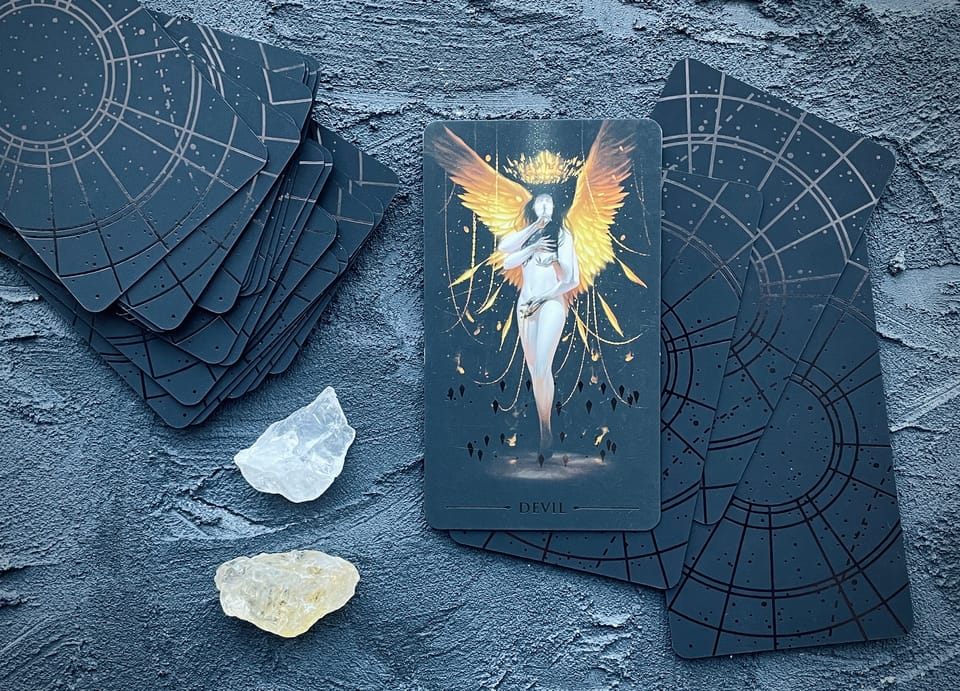
hello, friends, and welcome to april. a special welcome to all of my new subscribers! the winners of the audiobook giveaway have all been notified via email, so please double check your inbox to see if you've won. thank you all for being here, supporting my work, and reading these words. it means more to me than you know.
a few more quick announcements: finding the fool is officially one month old! you can find my first book at your favorite local shops or online, and i would absolutely love it if you would share your reviews on goodreads, amazon, and anywhere else you like.
i've also done a number of podcast appearances lately that you can check out: swimming in the soup with rebecca scolnick, the fool's journey with seth vermilyea, tarot visions with rose red, and hello universe with kyley caldwell & eva liao. listen wherever you enjoy podcasts and feel free to share on socials!
lastly, i'm once again open for client work, and this month's special audio offering is a crossroads reading. i'm only offering eight of these, so if you're interested in working with me head to my website to learn more and snag your spot. i also have three custom readings available, which include a fully personalized tarot spread, written PDF, and photographs, and can be tailored to your unique situation, challenge, or question. i'll also have an update about the next session of devils & digits for you within a week or so.
today, we're digging into one of the most misunderstood and feared archetypes in the tarot: the devil. grab something to drink, loosen your jaw, stretch your shoulders, and let's get into it.
the devil is a difficult archetype to write about.
the devil is so intimate, so personal, so intensely and powerfully vulnerable, that writing about it feels like a raw stripping away of every last shred of armor, clothing, skin. i’ve rewritten this essay nearly a dozen times, trying to figure out how much to share, how much to let you see, how much i’m willing to own.
the devil is uncomfortable, and that's kind of the point.
is it even worth writing about the devil if it’s only hypothetical, if everything is shrouded in metaphors and fairy tales, if i hide behind my words? is it really worth reading about the devil if you don’t feel it, if there’s not a bit of restless squirming, if you can’t peer between the lines and see the shadows lurking there?
doesn't the power of the devil thrive in what we leave hidden? isn’t the solution to this struggle to share what we know, to let ourselves be seen?
take a deep breath, friends. (content warning for discussion of depression.)
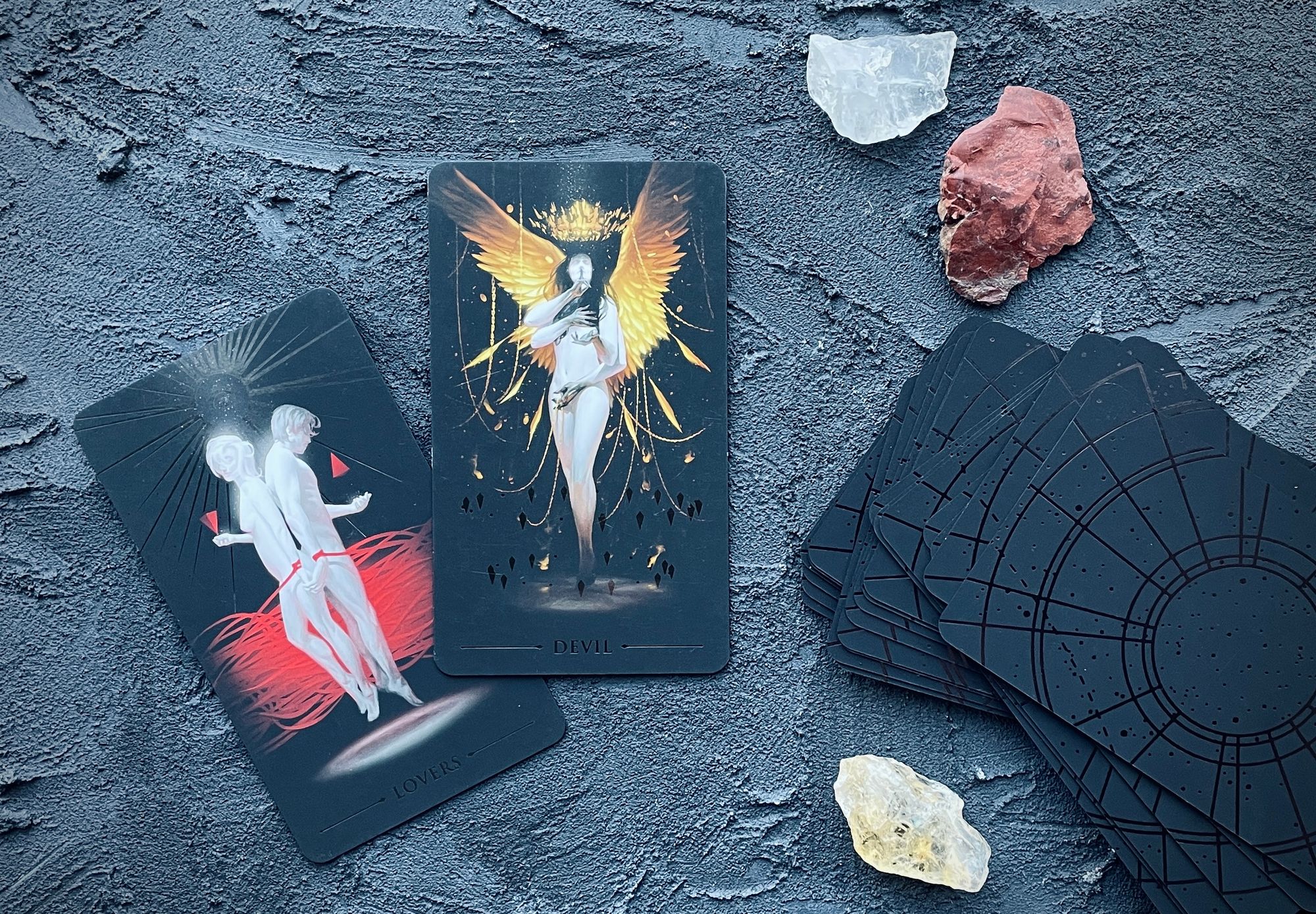
the numerological axis of the lovers (card 6) and the devil (card 15 // 1+5 = 6) is one of vulnerability and shame, something i have been reading a lot about lately. it’s what we are willing to let others access, and what we keep secret for ourselves, from ourselves. it’s how the decisions we make reveal what we desire, what we long for, what we need to survive — and how we must take responsibility for those decisions, in one way or another.
the number 6 is a digit of connection and choice, of ownership and duty, of finding freedom and agency within the self as well as within community. there’s healing here, loving devotion and joyful reciprocity — but there’s also anxiety, perfectionism, balancing stability and curiosity, even recognizing shades of disappointment in all that we have not yet found or solved or felt. the devil and the lovers are two sides of the same coin, the shifts that can happen when we contract or expand, when we gaze backwards or forwards instead of honoring the present, when we see some things clearly and overlook others entirely.
what happens when we feel exposed? how do we shrink into ourselves, hold pieces back, restrict and restrain rather than keeping our hands open to give and receive?
the answers, for me, are where the devil lives.
i have major depressive disorder, but haven’t had a depressive episode in years — which is probably why at first, i didn't notice its recent, devastating return. for the last few months my sweet, observant partner has been asking me over and over if i was depressed, and i kept insisting over and over that i didn't think that i was depressed, that it didn't feel like it has in the past, that i was just having a hard time with the many challenges we’ve faced over the last few months.
i wasn’t lying, but i was still wrong.
living with depression means constantly trying to hear the canary in the coal mine: to learn to identify the signs of something coming, something lurking, a wraith skulking around the edges. for me, incoming depression has always felt the same — like i'm standing on the edge of a cliff and losing my balance, like my body is too heavy to hold itself up, like i'm being dragged down to the bottom of the ocean. but after years of medication, it hadn't occurred to me that my depression might emerge reborn, resurrected into something i no longer recognized.
i've long been terrified of being depressed again, of getting pulled back into that very specific and isolating kind of darkness. yet when it finally happened, i couldn’t see that i was already there, stumbling through the shadows, lost to myself. and that realization, that something i'd once known so intimately was now fully unknown, was (is) almost as painful as the depression itself.
of course, the devil isn't only depression or anxiety or PTSD or {insert mental illness or trauma here}. it's also behaviors, choices, decisions we make that erode and destroy. i've been living in that space too, reckoning with harm i've caused, working to repair what i’ve broken. and trying to simultaneously hold space for guilt over something real i’ve done while also battling the suffocating, shameful lies of depression? some days, it seems like this is simply too much grief for one person to carry, too much disgrace to bear. layer in the everyday weight of living in this country as a queer, chronically ill, nonbinary person and sometimes it's hard to justify getting out of bed at all.
in the deepest depression days, i worry that i’ll never feel alive again, in spite of my lungs still expanding and contracting, my heart still quietly beating in my chest.

for me, all of this is the devil: getting lost in something familiar but telling myself that it's different, missing essential pieces of truth, experiencing a loss of perspective. the devil highlights a lack of awareness that can lead to the eventual horror of discovery, the slow recognition of how far we've wandered, the kind of subtle destabilization that ultimately rocks us to our core.
there's a reason that some decks rename this archetype as the shadow.
the devil is being an unreliable narrator of your own life, looking in the mirror and not recognizing yourself within it, having to contend with mistakes and failures and blind spots. it's playing a trick on our own damn selves, and somehow still getting fooled.
in my experience, the devil's work isn’t always fast, is rarely just a single choice. often it’s quiet, careful, methodical; a slow slide into something dangerous, a gentle and careless repose. it feels familiar, even comforting, an old habit that we find relief in.
and sometimes the devil creeps in so slowly, you make a companion of them, welcoming the harmful thing with open arms.
grief is important. not just to recognize, but also to experience. when we make everything love-and-light, when we put a glossy veneer over anything uncomfortable or painful, when we refuse to look at the cause of a wound and slap a bandage on the surface instead, it can slowly but surely eat us alive. we don’t have to be defined by our mistakes, our choices, our mournings — but we do have to hold space for them, see them for what they are, own our part in them. and this balance of ruthless authenticity and necessary grace can be incredibly difficult to master.
when i make a mistake, when i hurt people i love, when i do or say something that i regret, it can be so easy to wallow in the grief i've caused, to fall into that five of cups anguish and never come out again. and there can be beauty in gloom, magic in melancholy, seductiveness in shadows, so much so that this process doesn't always feel only bad. it can become penance, slipping underwater and knowing that the self who eventually emerges will be transformed, reborn.
yet there is danger in identifying too closely with sadness, in letting that sadness become such a large piece of us that we are endlessly haunted by it. it's one thing to drag those five cups around for awhile, and quite another to drown in them.
if sorrow becomes all we remember, then we can make it all we know, and forget how to see or feel anything else.

although we tend to associate this archetype with pain or temptation, wise ones know that the devil can be useful, and help us stumble in just the way we need: calling attention to the ways that we have gotten lost, begging us to note where we place our feet. these disorienting devil moments that make us feel uneasy or unsettled can encourage us to slow down, to take stock.
but we are not all wise all the time. and as a dear friend recently reminded me, even the smartest people can do very stupid things.
sometimes, we tell ourselves that it’s easier not to stop and look, not to think, not to feel. sometimes we want to ignore the canary’s song, to keep going deeper into the darkness in spite of the warnings. sometimes, we don't want to look at something too carefully, because then we'll have to see it for exactly what it is.
and once something is known, it cannot be unknown. schrödinger's box and pandora's box have this in common: the knowledge we find once that lid is off cannot be easily forgotten. all we can do is acknowledge what we've perceived and take responsibility for releasing it.
all we can do is peer bravely into our shadows, and be honest about what we see.
the big lie of depression, and often of sadness and melancholy and grief and regret, is that we are alone: not just lonely or isolated, but truly forsaken. when i'm deeply depressed i often feel that i do not matter, that i could be lifted up and out of my life with no cost to anything or anyone. it's an endless aching void, a burden of sorrow that gets tangled up with my own sense of worth and value, an exhausting and frustrating paradox that makes every breath heavy.
and while friendship and love and community are not some sort of magic bullet for depression (therapy and meds and support and time are the only reliable combination i've found), feeling disconnected can make sorrow so much more agonizing, grief so much more bitter.
if you’ve never seen the haunting of bly manor, i'll try not to spoil too much of it for you here. there are so many different kinds of hauntings explored in this brilliant, poignant, heartbreaking ache of a show, hauntings that you should experience for yourself. what i will say is that bly manor is a story about loss, a ghost story that’s also a love story. it’s about living in the unknown, in spite of the known.
it’s about seeing what is coming for us, and living in the shadow of that fear anyway.
depression, and the devil, can both be like this too: we sense something hovering in the dark, waiting for the right moment, biding its time. and that waiting, that uncertainty, can strip away our joy if we aren’t careful, leave us trapped in a purgatory of our own making. as my friend valerie anne beautifully explored in her essay on the show's central love story, there’s something so powerful, so devastating, in watching these two women reach for each other in spite of knowing that they won’t have a happy ending: the most they can have is a happy right now. instead of making their lives about what isn't, they decide to make what is as beautiful as possible, for as long as it lasts.
they choose to be together in spite of the ghosts in their midst, even as one of them can see the spectre of future grief and inevitable loss more and more frequently, a constant companion watching from the shadowy depths.

having someone sit with us in the hardest moments, finding comfort from those that truly see us, letting ourselves be loved even when we feel unlovable, can be a game changer. and similarly, the medicine for the devil, for the shadows, for the grief, is in the power of connection.
the devil as an archetype, as a figure in the major arcana’s story, may indeed often serve as a useful stumbling block, one that encourages us to reassess. but course corrections can take many forms. and in being knocked out of our stupor, in being forced to account for our exploits, so much can be revealed, discovered, adjusted, learned, and also lost.
the twisting path of the devil is one that we tend to follow alone, one that lives within us, one we keep carefully obscured from prying eyes or curious questions. when we walk with the devil, we rarely want to admit it to anyone else, preferring to cling to our secrets, to wear our most effective masks, to hide in plain sight.
it's easy to make a mask part of our identity, to never take it off, to get used to its weight. and sometimes when i'm in this headspace, i wonder if i know myself at all.
yet when we are brave enough to listen, this archetype can remind us that we are never truly isolated or forgotten, that we know more than we think. and in reconnecting with those we trust, in sharing our fears and failures with them, we can gain new insights into who we are, what we have done, where we might go next. we can hear those essential reminders of our value and our impact, can remember that everything is not forfeit.
in exploring those internal shadows with honesty, we find so many buried treasures, even ones we have kept hidden from ourselves. we are none of us perfect, but/and/also everything that dwells within us is not bad, wrong, shameful, selfish, hateful, or haunted. there is good too, beauty and magic and wonder, joy and creativity and tenderness.
there can be love, even when we worry that we've lost our capacity for it. even when we wonder if we are still worthy of it.

the devil isn't only about self-flagellation and brutal punishment, about recognizing our blunders, about taking responsibility for the ways we have done wrong or caused harm. it's also about learning more about who we are, what we need, how we allow ourselves to grow and connect and be seen. it’s also about untangling our identity from our shame, and separating both of those things from regret, grief, or sorrow.
at its core, the devil archetype is about brutal, necessary honesty. honesty with self, honesty with others, honesty about our past and honesty about our future. it's a chance to take off the mask and be our full selves.
remember the lovers as the mirror to the devil: honoring our choices for better or worse, looking at what we have given and received, helping us find ourselves again. what can we glean from our mistakes? what does it mean to be vulnerable? what if we stopped letting shame run the show, and saw the beauty and truth within us too?
what if we remembered how to love ourselves, even (especially) in our darkest hours?
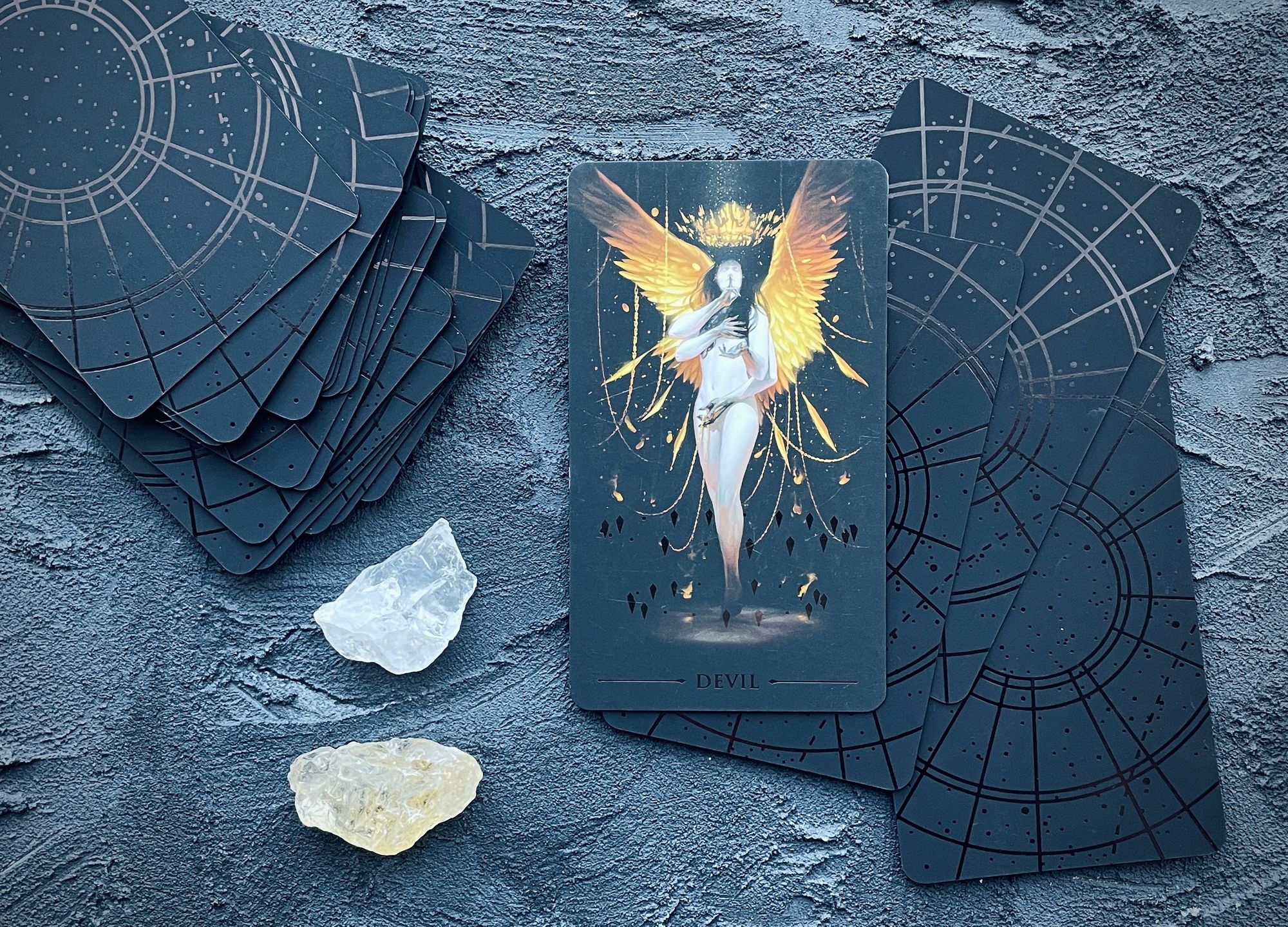
where are you truly making choices, and where are you just caught in the ebbs and flows of past mistakes? which old assumptions are influencing your current opinions, remaining unchallenged in spite of mounting evidence to the contrary? how can you course correct instead of clinging to something familiar, something that may not feel right? what are you ready to own, to examine, to discover about yourself? where are you ready to be free?
and in working with the devil, how could you reclaim parts of yourself that you have only ever viewed as shameful?
wishing you an honest, powerful, and transformative april, friends.
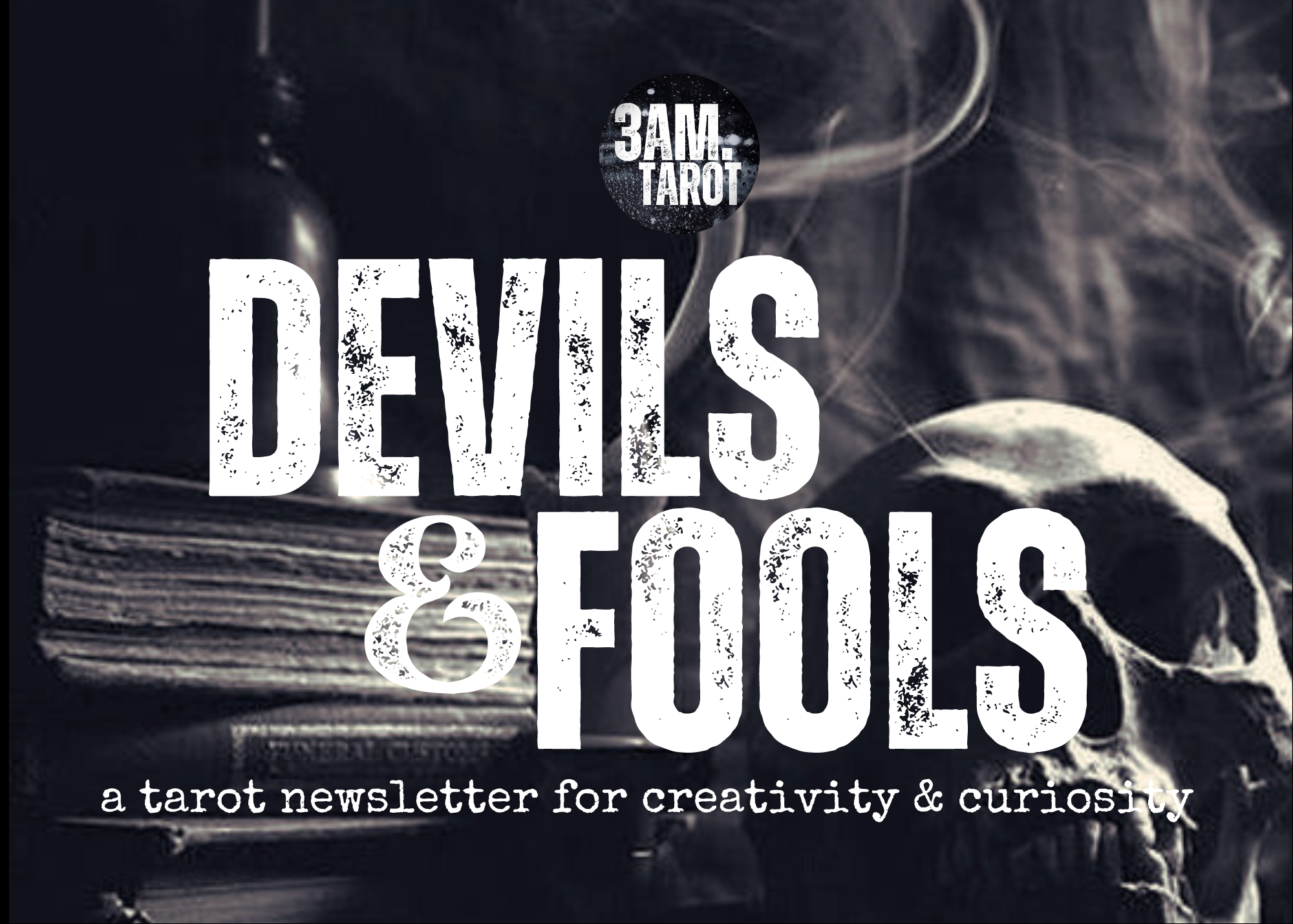



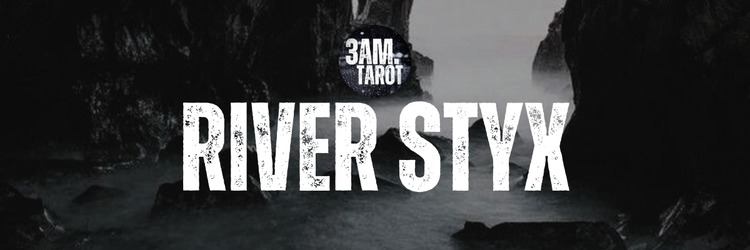

Member discussion